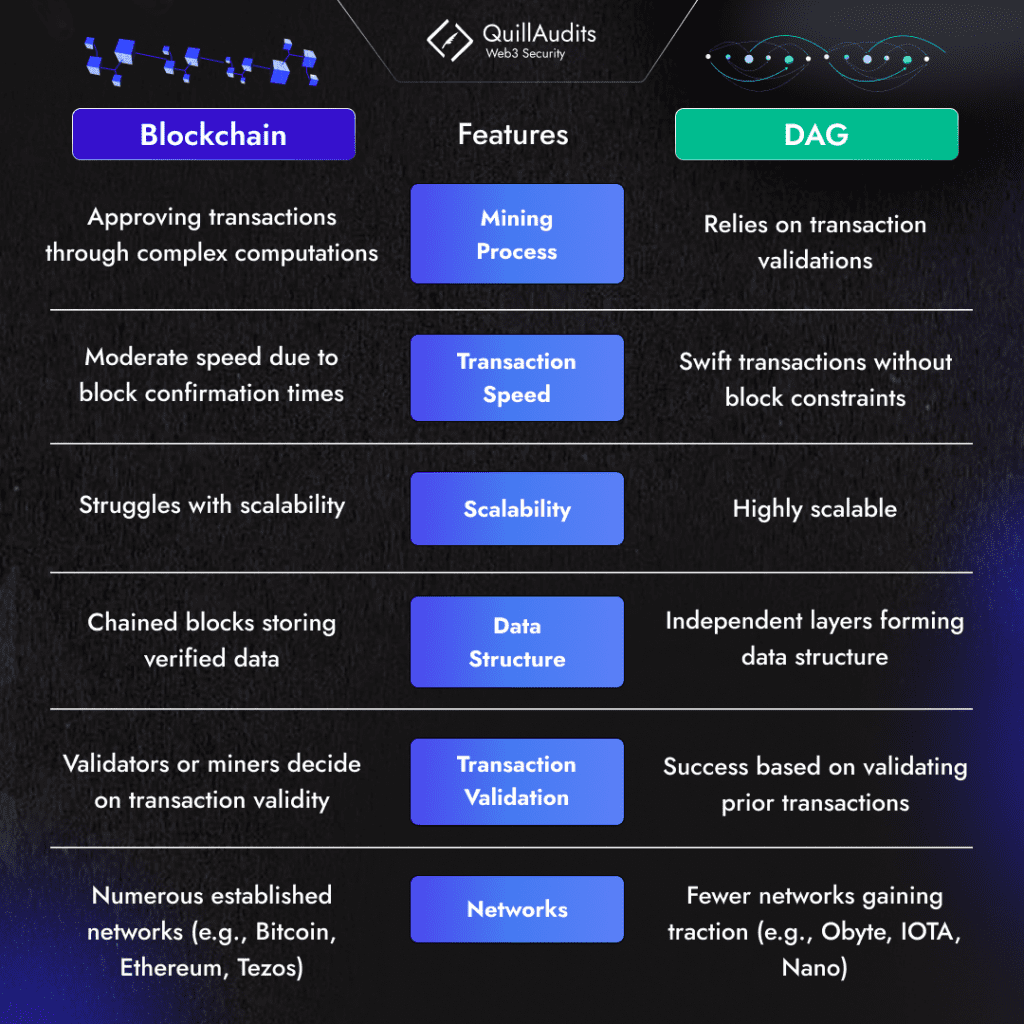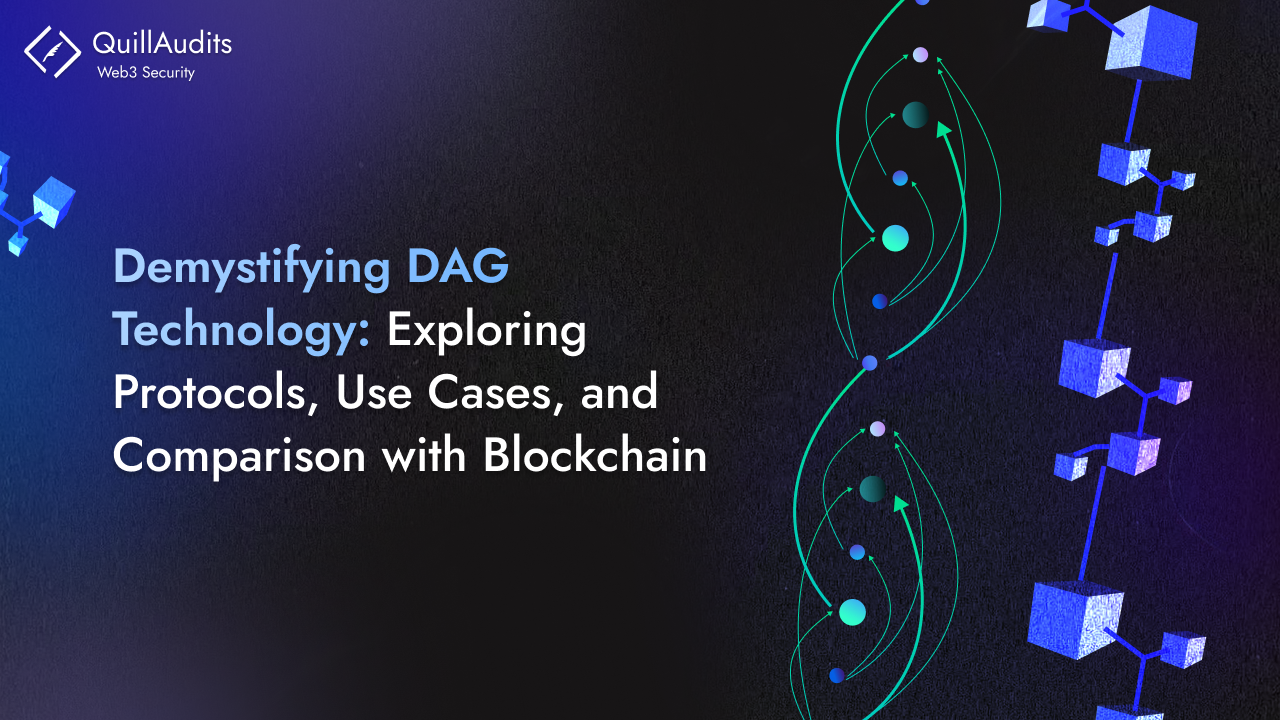Would you consider it if we stated there’s one other know-how that boasts simply as many use circumstances as blockchain?
Certainly, blockchains aren’t the one decentralized techniques as generally perceived.
Applied sciences like Direct Acyclic Graph (DAG) are respiratory new life into the cryptocurrency world.
Whereas sharing loads of similarities with blockchain, DAG tech is rising as the following step within the evolution of decentralized techniques.
So, let’s discover out on this article what they’re, their design to suit the real-world use circumstances, and the way they distinction with blockchain.
Let’s go!
Overview of DAG
DAG know-how, or directed acyclic graph, is an strategy to organizing and dealing with information, notably in cryptocurrencies. It is sort of a system of linked dots reasonably than blocks in a blockchain. As an alternative of blocks, you’ve vertices and edges.
Transactions in DAG are represented as these vertices, and so they’re stacked upon each other. Similar to in a blockchain, nodes add transactions, however right here, nodes have to carry out proof-of-work duties to submit a transaction.
The massive distinction? Whereas blockchains resemble a linear chain, DAG seems to be extra like a community of factors. DAG is gaining larger curiosity as a result of it would resolve some points in blockchain techniques. With DAG, miners gained’t be competing so as to add new blocks, and since nodes might be created concurrently, transactions might be processed sooner.
Now, how does it truly work?
- The DAG Setup: Think about an internet, not a sequence, dealing with transactions in a brand new system referred to as DAG. It’s like a tree with nodes (transaction factors) linked throughout. What’s extra attention-grabbing right here is these nodes can hyperlink to a number of others, permitting a lot of transactions to occur on the similar time.
- Referencing the Previous: So, for a brand new transaction to be legit, it should level again to older ones, very like blocks in a blockchain consult with earlier ones. The concept is {that a} transaction is barely validated when it’s referenced by one other, creating a sequence of confirmations.
- No Blocks: Every transaction is a vertex in a DAG, and there aren’t any blocks. No mining is required, both. Transactions simply construct on high of one another, and proof-of-work duties occur when a node submits a transaction to validate those earlier than it and forestall spam.
- Extra Connections, Extra Choices: In contrast to blockchains that stick to 1 earlier block, DAG-based transactions can level to a number of previous ones. Some techniques even use algorithms to decide on which transactions to construct on primarily based on their weight or the variety of confirmations acquired.
- Verifying Path to the Begin: To keep away from double spending, nodes affirm older transactions by following a path again to the primary transaction within the DAG. This verifies if the sender has sufficient stability. If somebody tries to construct on an invalid path, their transaction would possibly get ignored.
- Resolving Conflicts: When paths collide, an algorithm steps in, favouring transactions with a extra strong historical past. This algorithm ensures the system stays on observe.
The Dominating Benefits of DAG Know-how
Lightning-fast Transactions
One of the note-worthy attributes of DAG tech is its speedy transaction velocity. Its construction permits for concurrent transaction approval, enabling customers to provoke and obtain confirmations concurrently.
Dealing with A great deal of Transactions
DAGs boast a superior throughput, processing a exceptional variety of transactions per second (tps). In contrast to conventional blockchains constrained by block era occasions, DAGs effortlessly scale as extra contributors be part of.
Unparalleled Efficiency
In contrast to conventional blockchains that have congestion and efficiency degradation throughout spikes in transaction quantity, DAG networks thrive underneath elevated site visitors. Because the transaction load surges and consumer engagement intensifies, DAG techniques exhibit improved efficiency.
Price-Efficient
The omission of the miner validation considerably reduces transaction charges inside DAG networks. This streamlined course of allows extra transactions to be accommodated with out the worry of escalating charges.
Power-conscious
DAG protocols keep away from the energy-intensive PoW consensus mechanism, setting them aside as eco-friendly options to PoW-based blockchains. As cryptocurrencies like BTC face scrutiny relating to their impression, DAGs supply an answer by considerably decreasing power consumption.
Versatile Implementation
DAGs exhibit versatility past foreign money functions. Their compatibility with various consensus mechanisms permits seamless integration into varied sectors resembling IoT, provide chains, and different specialised domains.
Altogether, their scalability and resilience make DAG very best for platforms anticipating excessive transaction volumes.
DAG vs. Blockchain – Analysing Their Technical Distinction
- Mining: Approving Transactions vs. Transaction Validation
In blockchain, mining includes approving transactions and creating new cash by means of complicated computations. Miners affirm and add transactions to blocks, incomes tokens in return.
In distinction, DAG’s consensus depends on earlier transaction validations. Transactions achieve consensus by referencing prior ones with substantial weight.
- Transaction Velocity: Absence of Blocks vs. Scalability
Blockchains are recognized for velocity, however DAGs take the lead. With out block or wait occasions, DAGs guarantee swifter transactions.
Whereas blockchain struggles with scalability, DAG’s distinctive construction permits for a excessive quantity of transactions, enhancing scalability.
- Knowledge Construction: Chained Blocks vs. Impartial Layers
Verified information resides inside linked blocks in blockchains, forming an limitless chain. In DAG, information is saved independently, creating layers on high of one another.
- Transaction Validation: Miner Resolution vs. Approval of Earlier Transactions
Blockchains depend on miners or validators to determine on transaction validity. In DAG, a transaction’s success hinges on its skill to validate prior transactions.
- Networks: Broad Blockchain Adoption vs. Restricted DAG Networks
Bitcoin, Ethereum, and Tezos are among the many many blockchain networks. In distinction, DAG networks like Obyte, IOTA, and Nano are fewer however gaining traction.

DAG-powered Initiatives
TARAXA
- TARAXA incorporates BlockDAG know-how to reinforce scalability whereas sustaining sturdy safety measures.
- This implementation permits for prime throughput, surpassing 5,000 TPS.
- It has outlined a roadmap with bold plans to raise its efficiency additional, aiming for a powerful 50,000 TPS.
IOTA
- IOTA stands out with its utilization of Tangle, a DAG-based construction geared toward overcoming the constraints of conventional blockchain architectures.
- Tangle’s design facilitates near-instant, fee-less transactions, very best for IoT functions.
- Its multidimensional construction fosters interconnected transactions, eliminating the necessity for separate blocks or chains and enhancing scalability and efficiency.
- The platform’s testnet has demonstrated spectacular scalability, reaching over 10,000 TPS.
Nano
- Nano adopts the modern block-lattice framework, a hybrid combining DAG ideas with conventional blockchain. This construction permits for impartial blockchains for every consumer inside the community.
- Nano’s structure allows simultaneous transactions of any dimension with out incurring community charges.
- Every consumer manages their very own blockchain, offering a excessive diploma of autonomy and safety. Nano prioritizes high-speed transactions and 0 transaction charges.
Last Ideas
Contemplating the panorama we’ve explored, each blockchain and DAG showcase strengths and variations. It’s not about one being definitively higher than the opposite, however reasonably about their match for particular duties. Every has its personal execs and cons, tailor-made for various wants.
Embracing their distinctive strengths permits for creating extra environment friendly and adaptable techniques, elevating innovation within the crypto house.
Inquisitive about leveraging Distributed Ledger Know-how (DLT)? Chat with our QuillAudits consultants to show your imaginative and prescient right into a safe decentralized actuality.
420 Views

